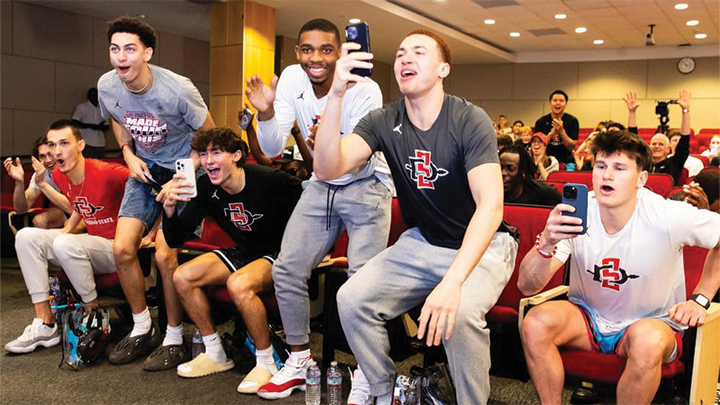March Madness Bracketology: A statistician’s guide for beating 1-in-147 quintillion odds of the perfect bracket
Fowler College of Business lecturer Chris O’Byrne, a college sports fanatic and former options trader on Wall Street, breaks down some of the math behind bracketology, and offers some tips for winning your bracket pool.

College basketball fans watch their favorite teams all season with the hope that come March, their squad will earn a berth in the NCAA Tournament.
Fans without a qualifying team, and plenty of others who don’t even follow the sport, might still become consumed by March Madness because of bragging rights at stake. Every year the tournament brings friends, families and colleagues together to compete in bracket pools, or challenges to see who can pick the most winners in a slate of 67 games.
Most know that picking a perfect bracket is next to impossible. Companies have long offered millions in sweepstakes cash to anyone who can accomplish the feat, but few know the simple math equation that explains why it’s so difficult.
San Diego State University NewsCenter asked Fowler College of Business lecturer Chris O’Byrne, a college sports fanatic and former options trader on Wall Street, to walk through that equation. O’Byrne offered a few tips that might help you beat the odds, and took a look at a few factors that could help or hurt the Aztecs’ chances of playing in the title game in back-to-back seasons.
Why is it so hard to pick a perfect bracket?
The chances of picking a perfect bracket is: 1 in 2 to the 67th power, or 1 in 147,573,952,589,676,412,928, or about 147 quintillion. This assumes that each participant has a 50/50 chance of winning. Since the tournament is seeded, this changes the odds a little bit in the bracket filler’s favor, but the fact remains that is how many different or unique brackets can be created from 68 teams.
How improbable was it to see 16th-ranked Fairleigh Dickinson beat no. 1 Purdue last March?
It was very improbable. In the first 139 match ups between the 1 and 16 seeds, the 1 seed won. So the 16 seed was 0-139. Granted, there have been some very close, nail-biting, almost upsets, but in the end, the 1 seed always prevailed. From a strictly probabilistic standpoint - 0.714% (1 out of 140) - and that may be too high – but strictly using a relative frequency probability model – less than 1%. I do believe there are fatter tails for the 16 seed to knock off the 1 seed than indicated above due to competition and parity between teams closing.
How can success or failure in the final leg of the season impact the Aztecs’ chances of competing for the National Championship for the second year in a row?
A successful final leg of the season, including in the Mountain West conference tournament, can provide the Aztecs with momentum and confidence heading into the NCAA Tournament and helps their case for a better seed in the NCAA Tournament. Higher seeds generally have more favorable matchups in the early rounds, increasing the Aztecs’ chances of advancing deeper into the tournament.
An impressive run up to Selection Sunday could lead to increased national recognition and attention from basketball analysts. This can boost the team’s confidence and potentially influence tournament selection committees, leading to more favorable matchups and considerations.
Conversely, failure down the stretch or even key injuries, can hurt the Aztecs’ confidence and momentum and translate to poor play in the NCAA Tournament. Losses in critical games could result in a lower seed, leading to tough early-round matchup and possibly an early exit from the tournament.
Do you have any tips for winning office bracket pools? Do you recommend picking the lowest seed to win each matchup? Why or why not?
Winning an office bracket pool often requires a balance of safe picks (higher seeds) and calculated risks (lower seeds and upsets). Don’t solely pick the favorites to win each matchup. While upsets are a big part of March Madness, they are still relatively rare, especially in the early rounds. A good strategy is to mix in some lower-seeded teams for upsets, but also pick higher-seeded teams that are strong contenders.
Higher seeds are higher for a reason. They often have better overall records, stronger schedules, and more talent. It’s generally a good idea to pick higher seeds to advance in the early rounds, but also be strategic about where you pick your upsets. One common first-round upset to consider is the 12th seed defeating the 5th seed. This happens more frequently than other upsets and can be a good place to take a risk. It’s often better to take calculated risks as the tournament progresses and the stakes get higher. While upsets are exciting, being too risky too early can lead to a busted bracket quickly.
Teams that performed well in their conference tournaments often carry that momentum into March Madness. Look at how teams performed in their conference tournaments as an indicator of their current form.
What are some of the other key factors?
It could also help to analyze teams beyond their seeding. Consider factors like team styles (fast-paced vs. slow-paced), strengths and weaknesses (strong defense or poor three-point shooting), and recent performances. Some matchups favor certain teams even if they are seeded lower.
Unfortunately, injuries can significantly impact a team’s performance, especially in the tournament. Keep an eye on injury reports leading up to the games and adjust your picks accordingly.
Ultimately, March Madness is unpredictable, and even the most well-researched bracket can be busted by unexpected outcomes. Trust your instincts but also use data, statistics, and analysis to inform your picks.
Lastly, have fun. Remember, part of the enjoyment of March Madness is the unpredictability. Even if your bracket doesn’t win, the excitement of the games and the camaraderie of participating in an office pool can make it a fun experience.



